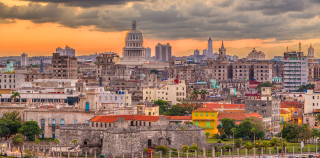- Pregnant travelers are at a higher risk of illness and injury. Therefore, it’s a good idea to opt for travel insurance.
- According to Johns Hopkins, it is generally advised not to travel after 36 weeks of pregnancy for domestic trips, and after the 28th week of pregnancy for international travel.
- According to the CDC, cruises may not allow you to travel after 24–28 weeks of pregnancy, and you may need to have a note from your doctor stating you are fit to travel.
- Many pregnancy-specific scenarios may not be covered by travel insurance, such as routine prenatal care, the cost of childbirth, false labor, and bed rest.
- Non-pregnancy-related illnesses, medical emergencies, accidents, and injuries will typically be covered as part of your travel insurance plan.
- CFAR insurance is the best type of insurance for pregnant travelers as it allows you to cancel your trip for any reason and still be reimbursed.
- If you get pregnant after buying travel insurance, review your policy’s terms and conditions and contact your provider to answer any questions you have.
- To help you find the best travel insurance for your trip, try using an online comparison tool. This way you can get multiple quotes and compare your options easily in one place.
On This Page
- Key takeaways
- Coverages to look for when buying pregnancy travel insurance
- Which pregnancy complications does travel insurance cover?
- What pregnancy issues are not covered by travel insurance?
- Airline rules for flying while pregnant
- What if I get pregnant after buying travel insurance?
- Things to consider when traveling while pregnant
- Pregnancy travel insurance FAQ
- Recommended articles
- Related topics
On This Page
- Key takeaways
- Coverages to look for when buying pregnancy travel insurance
- Which pregnancy complications does travel insurance cover?
- What pregnancy issues are not covered by travel insurance?
- Airline rules for flying while pregnant
- What if I get pregnant after buying travel insurance?
- Things to consider when traveling while pregnant
- Pregnancy travel insurance FAQ
- Recommended articles
- Related topics
Guide to Traveling While Pregnant: Pregnancy Travel Insurance
Our top picks for the best pregnancy travel insurance
Our top picks for pregnancy travel insurance
Faye Travel Insurance
Generali Global Assistance
Tin Leg
Coverages to look for when buying pregnancy travel insurance
When shopping for pregnancy travel insurance, there are several details to keep in mind. First, you should know that travel insurance coverage and included benefits vary from plan to plan, and that coverage limits also vary by provider.
Pregnant women should ensure they have some basic travel insurance benefits in place such as health coverage and travel cancellation benefits. This will help ensure they get proper care if pregnancy complications arise during a trip, or if they feel unwell and require a medical assessment.
Here’s a rundown of the main types of pregnancy coverage to look for in travel insurance that covers pregnancy:
Emergency medical insurance
All travelers should make sure they have a travel insurance policy with adequate limits for emergency medical expenses, but this is especially true for pregnant people. That’s because pregnant travelers are at a higher risk for injury or illness that requires hospitalization.
Many medical travel insurance plans will typically cover complications that arise mid-pregnancy during a trip, including ectopic pregnancy, miscarriage, preeclampsia, and more. Since nearly anything could go wrong and medical care tends to be expensive, pregnant people should look for travel insurance cover that has high limits for emergency medical treatment.
Emergency medical evacuation coverage
Having pregnancy travel insurance with excellent medical evacuation coverage is also crucial, or at least it can be for pregnant women who may need to be evacuated home to give birth. Medical evacuation coverage can pay for ambulance rides as well as helicopter transport to the nearest medical facility, or even plane transportation back to your home country if deemed medically necessary.
Trip cancellation insurance
Many travel insurance providers will reimburse you for all or a portion of your nonrefundable trip costs if you have trip cancellation coverage. If you already knew you were pregnant before purchasing insurance then this is usually not a valid reason for cancelling your trip. However, pregnancy may be a valid reason if you find out after you’ve booked, for example, a Christmas trip to Mexico and paid for an insurance policy.
Surprise pregnancy and trip cancellation
Imagine you are planning a week-long hiking trip through Costa Rica or a crusie around the Bahamas and you decide to book plane tickets and your hotel stay almost one year out. As the trip gets closer, however, you find out you’re pregnant and decide you shouldn’t be hiking the jungle during mid-pregnancy, which is where the dates of your trip happen to fall.
While this isn’t always the case, some trip cancellation policies list pregnancy as a covered reason where coverage can apply. Make sure to read over your policy documents, including the fine print, so you know whether you have coverage for surprise pregnancy and trip cancellation that results. Alternatively, you may want to opt for year-long travel coverage.
Late-term pregnancy and trip cancellation
If you’re worried about being able to cancel a trip and get some of your non-refundable travel expenses back based on recommendations not to travel that come from a healthcare provider, you may want to purchase “cancel for any reason” or CFAR travel insurance that lets you call off your trip for any reason and receive 50% to 80% of your prepaid trip cost back.
Now imagine you planned a trip to Mexico or France during pregnancy on purpose, but your healthcare provider becomes worried about blood clots and advises you not to travel. In this case, there are no active medical conditions preventing you from travel, so your plan may not provide coverage at all.
Trip interruption insurance
Trip interruption coverage can kick in to provide financial support when your trip is interrupted for reasons beyond your control. In the case of a pregnant person traveling, this coverage could prove crucial if a pregnancy-related complication occurs while traveling.
Insurance for lost or delayed baggage
Pregnant travelers should also make sure they have coverage for lost or delayed baggage just like any other traveler. This kind of insurance can help replace luggage that’s lost by a common carrier, as well as personal belongings up to plan limits. Baggage delay insurance can also pay for incidental expenses that pop up when bags are delayed for a certain length of time (usually 6 to 12 hours) depending on the plan. For example, if your baggage is held up for an extended period on your trip to Japan, you can be reimbursed for maternity clothing and toiletries needed during that time.
Trip delay coverage
Trip delay coverage can pay for incidental expenses that result when a trip is delayed for reasons beyond the traveler’s control, including meals, hotel stays, and more.
Which pregnancy complications does travel insurance cover?
Examples of unexpected and unforeseeable medical complications related to pregnancy that could potentially be covered include:
- Pre-eclampsia: a condition that causes high blood pressure and damage to organs.
- Gestational diabetes: diabetes that develops during pregnancy.
- Hyperemesis gravidarum: severe and persistent vomiting during pregnancy that can lead to dehydration and weight loss.
For a traveler to be covered for pregnancy and complications that result from pregnancy, the details must be specifically listed in the policy they buy. This means you’ll need to read over the pregnancy travel insurance plans you’re considering from front to back to know what’s included for sure.
It’s important to note that some travel insurance policies may have exclusions or limitations related to pre-existing conditions or complications, so it’s always a good idea to review your policy carefully and contact your insurance provider if you have any questions or concerns.
What pregnancy issues are not covered by travel insurance?
Because travel insurance is meant to cover emergencies and not regular healthcare, many scenarios and pregnancy issues are not covered by this kind of insurance at all.
Childbirth
Childbirth without complications is not covered through travel insurance. The only scenario where childbirth could be covered is if the mother winds up with complications that arise during delivery. In that case, emergency medical expenses could be covered by a plan.
Disinclination to travel
Disinclination to travel due to pregnancy may or may not be covered by travel insurance. This depends on the details listed in the policy and whether pregnancy is considered a “covered reason” not to travel.
False labor
False labor is not typically covered through travel insurance, although complications that result from false labor could be.
Physician-prescribed bed rest
If a physician prescribes bed rest during a trip, this is not covered through a traditional travel insurance plan. However, emergency medical evacuation coverage could apply if evacuation to your home country is deemed medically necessary.
Routine prenatal care
Also note that typical prenatal care is not covered by travel insurance. This includes general medical care you might receive if you wind up experiencing morning sickness or spotting, as well as check-ups.
Airline rules for flying while pregnant
We already mentioned how commercial air carriers have their own rules regarding pregnant travelers.
However, you should know that most of their policies set limits on pregnant travel during the third trimester only, which wouldn’t impact travelers who are in their first trimester or taking a trip during their 24th week.
Here are some airline policies for pregnancy from several major air carriers:
- American Airlines: American Airlines allows pregnant women to travel during their third trimester, although those who plan to travel within four weeks of their due date must provide a doctor’s certificate that shows they are fit to travel.
- Delta Air Lines: Delta Air Lines does not impose any travel restrictions on pregnant travelers, nor do they require a doctor’s note or certificate.
- Southwest Airlines: Southwest Airlines does not impose any specific conditions or restrictions for pregnant people who want to fly, but they advise against flying after the 38th week of pregnancy. The airline also recommends consulting a physician before flying.
- United Airlines: United Airlines requires a physician’s certificate, including an original and two copies, for pregnant travelers who want to fly after their 36th week of pregnancy. The certificate must also be dated within 72 hours of the planned departure time for the flight.
- JetBlue: JetBlue does not allow travelers to fly within seven days of their due date without a physician’s note saying they are fit to travel. The note must be dated within 72 hours of the planned departure time for the flight.
What if I get pregnant after buying travel insurance?
If you become pregnant after purchasing a travel insurance policy, you should review your policy’s terms and conditions to determine what coverage you may have. It’s important to review your policy carefully and contact your travel insurance provider as soon as possible if you have any questions or concerns about your coverage. They can help you understand your policy’s coverage and options, and may be able to provide assistance.
Getting pregnant after you buy travel insurance is very common, especially since many people book airfare and hotels up to one year out.
If you are planning a trip but believe you might become pregnant before the travel date, it’s smart to keep that in mind as you figure out the exact dates for your vacation.
Things to consider when traveling while pregnant
If you’re planning on traveling while pregnant, you should consider the following as you plan your vacation.
General risks
According to Johns Hopkins, it is generally advised not to travel after 36 weeks of pregnancy for domestic trips, and after the 28th week of pregnancy for international travel. The CDC also advises against traveling while pregnant to countries that require pre-travel vaccination. The American College of Obstetricians and Gynecologists notes that most common pregnancy emergencies usually happen in the first and third trimesters
If you have a history of any of the following conditions or complications, it may also be best to wait until after childbirth to travel:
- History of miscarriage, ectopic pregnancy, premature labor, or current placental abnormalities
- Incompetent cervix
- Multiple fetuses in current pregnancy or history of multiple pregnancies
- History of toxemia, high blood pressure, or diabetes during pregnancy
- History of infertility or trouble getting pregnant
- Pregnancy for the first time beyond the age of 35
- Heart problems
- History of blood clots
- Severe anemia
Destination-specific travel risks
You may also be advised against traveling to destinations with specific risks, and you should do some research of what potential risks are before you book a trip.
For example, you may not want to travel while pregnant to:
- Destinations at a high altitude
- Places that have outbreaks of life-threatening food- or insect-borne infections
- Destinations where malaria or Zika virus are common
- Destinations where you’re recommended to have a live virus vaccine before travel
- Destinations where medical care for pregnancy or delivery may be inadequate
- Places with high levels of COVID-19*
*If planning to travel to a location with high levels of COVID-19, ensure you opt for a travel insurance plan that covers COVID as any other illness.
Best types of travel for pregnancy
Consider which types of travel may actually be enjoyable while you’re pregnant, and whether you’re better off just staying home and planning a future trip instead. Where a relaxing beach vacation could be excellent for pregnant mothers, high-stress trips or travel with lots of physical activity, such as a trip to celebrate Carnival in Brazil, may not be worth it.
According to the American College of Obstetricians and Gynecologists (ACOG), the best time to travel is mid-pregnancy (14 to 28 weeks). The ACOG always recommends speaking with your healthcare professional about travel during pregnancy and keeping your comfort and safety in mind as you make travel plans.
Flying while pregnant
The ACOG says that occasional air travel during a normal pregnancy not considered high-risk is typically safe. However, the organization says you should avoid flying if “you have a medical or pregnancy condition that may be made worse by flying or could require emergency medical care.”
To make air travel as comfortable as possible, the ACOG recommends the following:
- Book an aisle seat whenever possible.
- Avoid drinking carbonated drinks during your flight and drink bottled water instead.
- Wear your seatbelt on the plane to protect yourself and your unborn baby.
- Get up and walk around a few times during your flight.
Buying cancel for any reason (CFAR) coverage
CFAR insurance is the best type of insurance to get when you are pregnant. Purchasing “cancel for any reason” coverage from your insurance company can provide considerable peace of mind as it lets you cancel your trip for any reason at all and get part (usually 50% to 80%) of your pre-paid trip cost back. It’s typically sold as an add-on, so you can get medical coverage as well.
It’s also important to note that this coverage can reimburse you regardless of whether you have a pregnancy complication. So, you can use it to cancel your trip and get reimbursement even if you just decide to stay home. However, this is the most expensive type of travel insurance. Therefore, additional premiums will apply if you want to add CFAR coverage to your travel insurance plan.
Pregnancy travel insurance FAQ
Do you need to tell travel insurance you are pregnant?
You don’t need to tell your travel insurance company you’re pregnant unless this information is requested when you apply. However, if you have any doubts about coverage for pregnancy, it may be helpful to let your provider know when you book.
Does travel insurance cover cancellation due to pregnancy?
Some plans include pregnancy as a reason for trip cancellation, but many do not. Make sure to read over your policy details so you know for sure. When in doubt, opt for a cancel for any reason travel policy.
Is travel insurance more expensive when pregnant?
Pregnancy travel coverage isn’t necessarily more expensive. You can find affordable travel insurance covering the most common risks of pregnancy. However, pregnant travelers may want to purchase comprehensive coverage with higher limits for emergency medical expenses and medical evacuation. In this case, it would be more expensive than simply having basic coverage.
Does travel insurance cover childbirth?
Travel insurance does not cover the expenses of traditional childbirth. However, some expenses may be covered if complications occur that require medical intervention.






























































